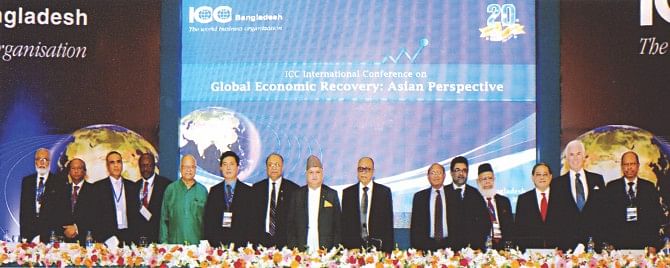Global business leaders call for inclusive growth

Businesses and policymakers alike yesterday called for inclusive growth as the traditional approach taken so far has largely failed to benefit the poor and cut disparity in the last few decades.
“I think we need to start talking about growth and, more importantly, inclusive growth and a growth model that will carry with it the people below the poverty line and those who are less privileged,” Sunil Bharti Mittal, chairman of Bharti Enterprises, the parent company of mobile operator Airtel, said yesterday.
“Only a society which is at peace with itself can create growth.”
Mittal, also the vice-chairman of the International Chamber of Commerce, said businesses will flourish when all sections of the society are moving forward together.
His comments came at the inauguration of the two-day conference styled 'Global Economic Recovery: Asian Perspective', organised by the International Chamber of Commerce Bangladesh at Bangabandhu International Conference Centre in Dhaka.
Mukhisa Kituyi, secretary general of the United Nations Conference on Trade and Development, said social inclusion is critical for the long-term survival of businesses.
Enterprises must be an equal partner with governments and civil societies in finding ways to progress, he said.
Finance Minister AMA Muhith said businesses should also look to lift people out of poverty. “Otherwise, there would be no demand for the goods and products you are producing.”
Commerce Minister Tofail Ahmed said growth in Bangladesh has to be inclusive, and the country also needs to manage its urbanisation properly as it is putting strains on resources.
Mittal also touched upon the issue of movement of people within the World Trade Organisation framework.
“This issue is extremely important for Bangladesh, as it is for India.”
Bangladesh receives billions of dollars in remittance, while India receives over $40 billion annually.
“The world needs people and these two countries have people,” he said, adding that Asia, with its large youth population, can supply labour to the rest of the world.
“We need to have labour movement available to them -- we need to encourage that. This is an agenda the ICC should lead going forward.”
He said chambers, trade bodies and individual businesses have a big responsibility towards the development of global trade agenda.
Mittal, who is set to become the next chairman of ICC, also praised Bangladesh's steady 6 percent economic growth since 1996.
“I think the Bangladesh model holds a lot of hope for all the developing countries around the globe,” he said, while commending the ICCB and its current leadership for promoting the chamber in this part of the world.
Meanwhile, Kituyi said the ICC would face a challenge in the coming days in balancing the objectives of businesses and aspirations of the people.
There is a popular notion that business interests and aspirations of the people contradict each other.
“We have to find a model where the growth in trade would work in cutting income inequality and cut poverty,” he said, adding that the ICC has an important role in achieving a sustainable future.
The UNCTAD head said policymakers need to look at how to improve employment policies and improve tax collection.
Coping with rising inequality should remain a collective priority in Asia and the gulf of inequality has to be addressed properly, he said, while urging the South Asian nations to increase spending on social protection and youth employability.
Kituyi said some of the excesses, particularly in the financial sector, blamed for the financial crisis have to be corrected.
ICCB President Mahbubur Rahman said in one hand, Asian economies have grown tremendously in recent years, but on the other hand, Asia has the highest number of population living on poverty. “This is not an acceptable situation.”
Victor K Fung, chairman of ICC Research Foundation, termed Bangladesh a key beneficiary of globalisation, which has been an incredible force in the developing world in the last couple of decades in pulling millions of people out of poverty and improving their livelihood in many Asian countries.
However, there are some developments, which are bound to change the dynamics of global growth in the coming years.
One of them is the emergence of 3 billion new entrants to the global middle-class in the next 30 years, with Asian consumers alone accounting for 50 percent of global consumption.
Secondly, the advancement in technology is accelerating changes in all aspects of the business world, he said.
Fung said there is a rise in concern about environmental sustainability and social equity, which is influencing consumers and businesses alike.
Fourthly, there is also the pressure on multilateral trade system. It has to be designed in a way so that it can fit in the 21st century.
“This is not just about Doha Round or trade facilitation agreement, although we do need that. This is about trade continuing to remain as an engine of growth and development.”
He went on to call for the right architect and governance to facilitative the flow of goods and services in the modern era.
“The world is entering a new era of global commerce which is full of complexities. So, we will need people's collaboration and dialogue to smooth the trade further.”

 For all latest news, follow The Daily Star's Google News channel.
For all latest news, follow The Daily Star's Google News channel. 



Comments